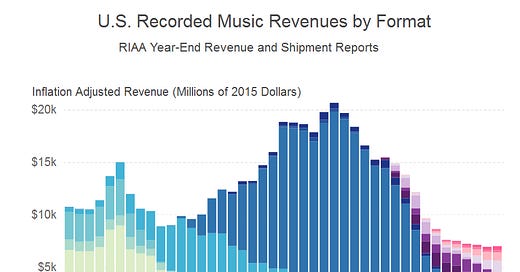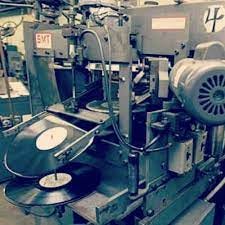Vinyl Sales Have Grown Every Year Since 2007
Last month, the American Enterprise Institute published a nifty animated data visualization from Mark J. Perry. This animation visualizes historical data of music sales, by format, from the years 1973 to 2020 along with a lot of other fascinating insights.
One of those insights, which garnered some headlines at the time, is that vinyl sales outpaced CDs for the first time since 1986. The second, and almost equally as surprising, is the realization that the music industry’s quite alive and well, with record sales projected to reach $15.4 billion by the end of this year. While that’s still a far cry from the previous record from 1999, worth $26 billion when adjusted for inflation, it’s still far better than the constant doom ‘n gloom that’s haunted the music industry for most of the 21st Century.
One last surprising takeaway from the AEI visualization, which is based on sales figures from the RIAA, is how much of that revenue comes from streaming subscriptions. A staggering, jaw-dropping 84.2% of the music industry’s revenue comes from streaming!
Are these figures just another example that we won’t own anything in the future, instead merely leasing our monthly content from digital landlords? Is it a sign of the ultimate victory of the fetishization of culture, where all physical ownership is relegated to a status symbol? Is it a signal of a desire for Zizekian presence in an increasingly digital age? Or the final triumph of nostalgia over innovation, as we gradually accept our glory days are behind us? That, in fact, we’ve done the best we can and we’d do well to turn back now, while we still can?
I’d wager it’s a little of some of all of the above, which is one of the reasons i’m writing this publication in the first place. These are thorny, knotty subjects that are difficult to think about let alone put into words.
Two takeaways that seem safe to assume based on these figures:
Presence does matter, in a virtual world. We still prioritize the here and now, even when we’re surrounded by everything, everywhere, all at once.
Curation will play an even more important part in the future. We need crate diggers, archaeologists, historians, digital archivists and anarchic collagists. We need to learn to navigate the Archives like those monks in Borges’ The Library of Babel. Or DJ Shadow or Terminator X.
One more surprisingly eloquent thought is tacked on at the end of the AEI post accompanying the data visualization, talking about the incredible wealth of amazing music constantly available at our fingertips.
The abundance of low-cost (almost free) music also illustrates one of the shortcomings of traditional GDP accounting when it comes to measuring our economic well-being or standard of living. Americans’ “music well-being” is clearly at an all-time high for the reasons discussed above. But according to official GDP statistics that include retail music sales, the nation’s “music well-being” today (measured by $15.4 billion in projected sales this year) is about half of what it was in 1999 when music sales were $26 billion (in 2022 dollars)! According to official GDP accounting, the “Golden Age of Music” was back in 1999 during the era of CDs, when it’s obvious that we’re experiencing the most miraculous music renaissance in history with streaming music that isn’t remotely being captured by national income accounting.
That’s another reason for this publication. I’ve long held that traditional economics and accounting don’t know how to make sense of a digital world. We need to start factoring things in like creativity, happiness, and satisfaction along with other more tangible goods.
Two questions remain - will we see a return of ringtone sales? Or an 8-track revival? One simply can’t tell!
If you want to follow my crate-digging and digital curation, you can connect with me on Spotify or here some of my dj mixes as dessicant on Mixcloud.
You can view the full data visualization from Mark J. Perry over here.
Want More Thoughts on Vinyl?
Follow @for3stpunk on Twitter and Instagram, TikTok, Letterboxd, Goodreads, and drop by the Facebook page!
Liking Hauntology Now? Buy Us A Coffee!
and make sure to




